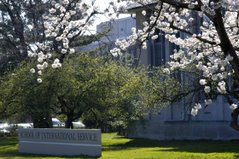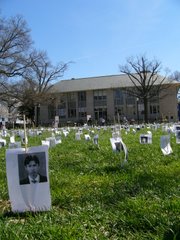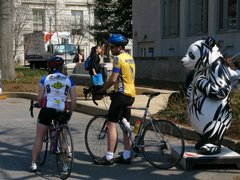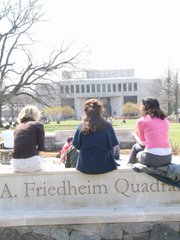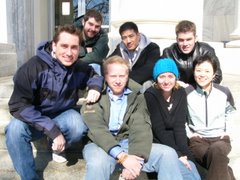SIS AUDIO LIBRARY
Tuesday, September 23, 2008
Springtime in Paris
While at Sciences Po, I will be taking graduate courses (en français bien sûr!) on European economics and politics, which will complete my course requirements for SIS! However, the classroom will only be a part of what I gain from the experience. Paris attracts students from around the world, and many of them—myself included—will be at Sciences Po. It will be after class, around an outdoor table at a café, with a glass of vin rouge and friends, that knowledge will be tossed around through discussion and, as is often the case, even (slightly) heated debate. Much like at AU, my peers at Sciences Po will teach me far more than I can ever hope to teach them.
Another block of my time will be consumed by my ‘substantial research paper’ or SRP as we call it in SIS. Sciences Po’s location in the heart of Paris is particularly apt for my research topic about how vintners are harnessing globalization. The chance to take courses in Paris greatly facilitates my ability to realize this project, since I will be able to visit the major wine producing regions in Europe (and France) to conduct interviews as part of my research.
The remainder of my time (if there is any) will be enjoyed at the cafés and markets in search of that joie de vivre for which Paris is so famous.
Brian Calhoon, 2nd year Master Candidate in SIS Contact info: bc0044a@student.american.edu
Wednesday, April 9, 2008
Internships are About Talking Too
My office particulars. The firm I work for does government, corporate and public relations all in one office. This has allowed me to work on several different projects. I was hired during “budget season,” to help compose reports on appropriations. (Side note: if you are not sure you want an internship, wait until the semester starts, there are always companies looking for interns throughout the year.) I am now solid at locating and analyzing bill text and can explain how different departments in congress get funding. International business development is also a part of our services, and I have done research for web content for different international organizations. Many public affairs firms follow current issues in telecommunication, energy or local politics for clients, and I have done a fair share of monitoring and writing briefings on different relevant issues. This experience is great for public relations type interviews, as you are always asked to speak about an issue you are following in the news. I have also gone to the hill to attend hearings, composing summary memos upon my return to the office.
How do I find cool projects to work on and avoid getting stuck with delivering the mail? Talk to people when it is slow—that is the time to walk around the office and ask people what they are working on now, find out what projects they have coming up and put in a plug for yourself when you find something really cool.
If you just hide, waiting until someone comes to find you to do something, you’ll probably end up delivering documents to a think tank or the hill (not without its advantages at times), instead of engaging in something that will develop a skill, like preparing press kits or background info for a business development project or conference planning. When it’s slow, that means not only do you have more time to talk as an intern, the people in your office probably do to. When everyone is running around the office going to meetings and taking conference calls, this is not the time to ask your boss what they are up to.
Also, when I find myself without a project or near the end of one, I try to put the word out to people I know that are working on something I want to learn about. Speaking to people in the office will not only give you insight and first dibs on really juicy projects, but also shows you are interested in the organization and excited to play a part. You will learn how each person fits into the company’s mission, and if this is a company you would like to work for after graduation (which is another question on the forefront of grads’ minds when picking an internship), this deep knowledge about the organization will be essential when describing how you can contribute as a full-time employee!
Socialize—it’s good for your career.
-Kate
Tuesday, April 1, 2008
Interning in DC
One of the things that really attracted me to SIS was its location in DC. During the summer, the government, nonprofits, and all other assorted organizations are choked with interns coming from all over the country. The fact is, its hard to find a summer internship – especially one that you actually want. But being located in DC means that as I go to SIS, I can get an internship during the semester, when there’s much less competition for the most desirable internships.
This is the type of situation that has enabled me to intern this semester at the Arms Control Association. I study International Politics for my degree here, but the real reason I came here was to work on nuclear nonproliferation issues. But being that there are only a handful of nonproliferation-focused nonprofits here in DC, its easier to find an internship at one of them during the school year than during the summer.
At ACA I am getting a lot of great experience working in the nuclear nonproliferation field. What I’m doing there is mainly helping them write Arms Control Today, one of the leading nonproliferation publications. When I took the internship, I figured on a typical internship experience. You know the deal – you do all the research and hard work, someone higher up puts their name on it and gets the credit. Instead, they’ve had me write news articles for ACT. So not only am I really delving into the issues I care about, but I even get credit for it.
Since starting in January, I’ve written an article for each of the two issues that have been published. My first was on two biological research labs that are opening up inside two of the
Anyway, the point here is just that great internships are few and far between, and youre a lot more likely to snag one for yourself if you are in DC year round and are available for fall and spring internships.
-Jeremy
Tuesday, March 11, 2008
Thesis or SRP?
As an SIS graduate student, you have lots of academic choices. Choosing whether to write a master’s thesis or another type of capstone work is one of them. Many people thinking about grad school wonder, “Do I have to come knowing what I’m going to write my thesis on?” The answer at SIS is no—but if you have an idea, great, if not you’ll find it while you here!
I’m not an academic guidance counselor, but I made the choice between an Significant Research Project (SRP) and thesis, as everyone else at SIS does. This blog is what I feel might be useful for those of you choosing a grad program or stressing about thesis.
The Technical Note: For the vast majority of SIS master’s programs you may complete either: 1. a substantial research paper (SRP) for 3 credits and a 3-credit internship, 2. a 6-credit thesis, or 3. a 6-credit research practicum. People choose SIS for graduate school for many reasons, and the research and writing requirement allows you to accomplish your own goals. In my last semester, I am taking a 3 credit internship and writing an SRP.
Roughly, the master’s thesis involves an 80-100-page paper representing an original contribution to the literature existing on your topic, the coursework is spread out over two (or more) semesters and accompanied by an oral defense at the end.
The Personal Note: I chose the International Communication program due the professional nature of the program, and writing an SRP and taking an internship for credit met my professional goals. I used the internship requirement (work in a field related to your academic coursework) to take time during this semester to explore a career I am interested in after graduation—I’m currently a government and public affairs intern at MWW and writing my SRP on the corporate sector’s contribution to public diplomacy in Eastern Europe.
If you’re really good, you might also be able to directly connect your internship and SRP. For instance, if you are working for an NGO and your job is to track and report on the recent democratic uprising in
I had a good idea of what I was interested in when I started at SIS, however, I had no clue as to what topic I wanted to devote myself to researching for my SRP until recently. Professors, especially in the International Communication program, encourage you to find your knowledge niche—an area/topic that you can explore in your class research projects and papers and develop as your base of expertise. The majority of paper topics are open, and you can test out your depth of interest in an area in many courses before you decide what it is that you’re passionate about before you commit to developing around 70 pages on it. And the SIS graduate academic advisors are always available to help you figure things out.
Bottom line is you don’t need to stress about what you’re going to write about, you just need to be motivated to explore.
Happy Academic Travels,
Kate
Master’s Candidate 2008
International Communication
Knowledge Niche: Public Communication & Eastern Europe
Wednesday, March 5, 2008
DC internships
Internships in D.C., I have had a few. Private sector, public sector, corporate, non-profit, paid, unpaid, for credit, not for credit… DC offers it all, and as a graduate student at SIS, internships give you the ability to test out professional life.
I finish my graduate degree in international communication (IC) this May. Right now, I am an intern at MWW Group, a government and public relations firm. It’s my third internship in DC and this one I am taking for credit to meet a requirement of the IC program (you can complete a master’s thesis or write a major research paper and do an internship for credit—SIS offers good program flexibility).
How do SIS students get internships? Methods vary, but I use resources like the SIS networking events, the AU CareerWeb (AU’s Career Center’s online job and internship database), SIS listserv messages (alumni and professors post job/internship openings and the career center sends out a weekly list) and my own contacts. These resources are tailored for SIS students, making your search for a relevant internship experience much easier.
The Career Center offers quick drop-ins in the SIS coffee house, which I used when I first began applying for internships. A quick edit from Olya Dadressan, an SIS career advisor, and my resume was markedly better. I was able to secure my current internship and one last semester at Mazda’s Government and Public Affairs Department by applying online through AUCareerWeb.
The Career Center and the SIS Graduate Student Council (GSC) also host networking events on campus throughout the year, giving current students the chance to interact with alumni, professors and career center advisors. These provide opportunities to find out about internships and get advice from professionals.
I was able to get a job for last summer through the GSC’s spring speed-networking event. I had not planned on attending the event, but my class got out early, so I went. I had been at work earlier that day, so I was dressed professionally and had a few business cards on me (I’ll admit I design/print my own on my computer). I went with the expectation that I might learn more about possible career paths and maybe make a contact. My initial contact with an AU alumnus at the event turned into a communication job at the National Association of Realtors. Networking opportunities are everywhere, being aware and making the time is the key!
This time around, I had the most success using the AU CareerWeb. After submitting applications (standard cover letter, resume and writing sample) to about seven companies, I was offered four interviews, three at public relations firms and one at an NGO, the Council for a Community of Democracies. I did prep for the interviews: read the organization’s websites, spoke to someone I knew who had interned there before and checked other publications that had covered the organization. Contacting the career center to see if they have any alumni contacts with the company to which you are applying is also useful. I sent thank you letters to those I interviewed with and at the end I had a few offers on the table. I choose MWW, because the job content fit closest to my career interests.
If you are just moving to DC, sans job, registering at a temp agency, like The Choice, Inc., is a good place to make some cash while job/internship hunting. Graduate school is about the last time you’ll be able to “test-drive” a career through an internship. You’re in DC—internships help you build your resume even if you’re not taking them for credit! It’s a very real possibility to find a part-time job or paid internship anytime of the year in DC, and balance with a full class load at SIS.
Important Note: The views expressed are my own and in do not necessarily represent the opinions, positions or strategies of MWW Group nor any other mentioned organization.
Tuesday, December 18, 2007
Active on the AU Campus and in Washington D.C.
My name is Leslie and I'm a second-year grad student at SIS, focusing my International Politics degree on Human Rights and Global Environmental Policy. Many of you probably saw all the news coverage about the protests in Burma earlier this fall. But what you likely didn't see was all the activist work that goes on behind the scenes here in DC. I've been fortunate enough to become involved in the Free Burma movement at AU, and I'd like to share some of that with you.
Like most activist causes, the Free Burma movement relies on a core group of focused, motivated, and dedicated individuals. From the annual student-led Alternative Break trips to the Thai-Burma border learning about the social justice aspects of Burma, to the Student Campaign for Burma here on campus that is composed of both graduate and undergraduate students, AU students have continually been at the forefront of campus and community Burma activism.
On campus, we "flagged the quad" to represent the 100,000 protesters in Rangoon and create a visual representation for the AU community (see more pictures on our blog). On the Hill, we filled a Senate hearing on the Saffron Revolution wearing tee shirts that proclaimed "UNSC Arms Embargo Now," and have alerted our campus community, friends and family to pass an important bill to shut down funding for the military regime. We helped to organize several protests at the Burmese, Chinese, and Indian Embassies which attracted several hundred individuals from DC and a good deal of media attention. We launched petition signing campaigns, film screening, speaker panels, and fundraisers for Burmese aid organizations. There are so many different ways to become involved, and I've had the chance to experience so many of them through my connections at American University and by being in Washington, D.C.
For more information on Burma activism at AU, please visit our blog at http://auburma.blogspot.com/, or email us at auburma@gmail.com .
Monday, December 10, 2007
Opportunities for Sudents to Publish
Today’s topic is our student-run journal, Swords and Ploughshares. The journal is an academic publication in the style of such periodicals as International Security and the Journal of Foreign Affairs. The articles are all written by students at SIS and Washington College of Law, and are typically refined pieces that were written for a class or for a research requirement. There is no central topic focus, other than the obvious international affairs theme. Anything within international affairs will be considered for publication. In recent issues we have published articles on various topics including international whaling laws and regulations; a comprehensive definition of terrorism; and the security of Russia’s energy sector.
I’m going to discuss two aspects of the journal as it relates to you, the grad student. First, Swords and Ploughshares presents you with a great opportunity for getting involved with something on campus. In the interest of full disclosure, I currently serve on S&P’s Editorial Board and as the Senior Copy Editor. It is not a paid job (wouldn’t that be nice…), but it can give you valuable experience in the publishing process that will serve you well on your résumé, especially if you are considering employment at a research foundation (a think-tank). Unless you are one of the senior editorial staff, the time commitment is relatively minimal.
Secondly, the journal is obviously a great opportunity to get your work published. We send out calls for papers at the beginning of every semester through the SIS listserv (I encourage you to subscribe to it) and also through “The Diplomatic Pouch”, our SIS newsletter. Submit something whenever you have a piece of work of which you are particular proud. The work you send us should be your very best. Don’t send us a rough draft or a paper you wrote overnight. Although we have editors, we want articles that exhibit a polished and professional writing ability. We have received articles in the past that contained potentially interesting subject matter, but were so poorly written that we had to decline them. The best way to ensure the professional caliber of your work is to involve a professor in the process. They can give you valuable insight into a research strategy, as well as helpful critique of your writing style and technique (remember, professors do this for a living). Don’t let your ego get in the way of improving your writing skills. Always have someone read and critique your work before you submit it for publication, and take their remarks seriously and objectively. Again, professors are the best source for this type of help. You won’t have to share authorship credit with them. All you have to do is thank them for their guidance in a footnote on the first page. Finally, it always helps to read the reputable journals in the field, such as the aforementioned. You’ll get a feel for what kind of style is appropriate for publication as well as how to structure a good argument. All this equates to better papers and, yes you guessed it, better grades in your classes!
So there you have it. Get involved and constantly seek to improve your skills as writer. I’m looking forward to seeing your submissions for future issues of Swords and Ploughshares.
Yrs. Truly,
Andy
“As in political so in literary action, a man wins friends for himself mostly by the passion of his prejudices and the narrowness of his outlook.” – Joseph Conrad
